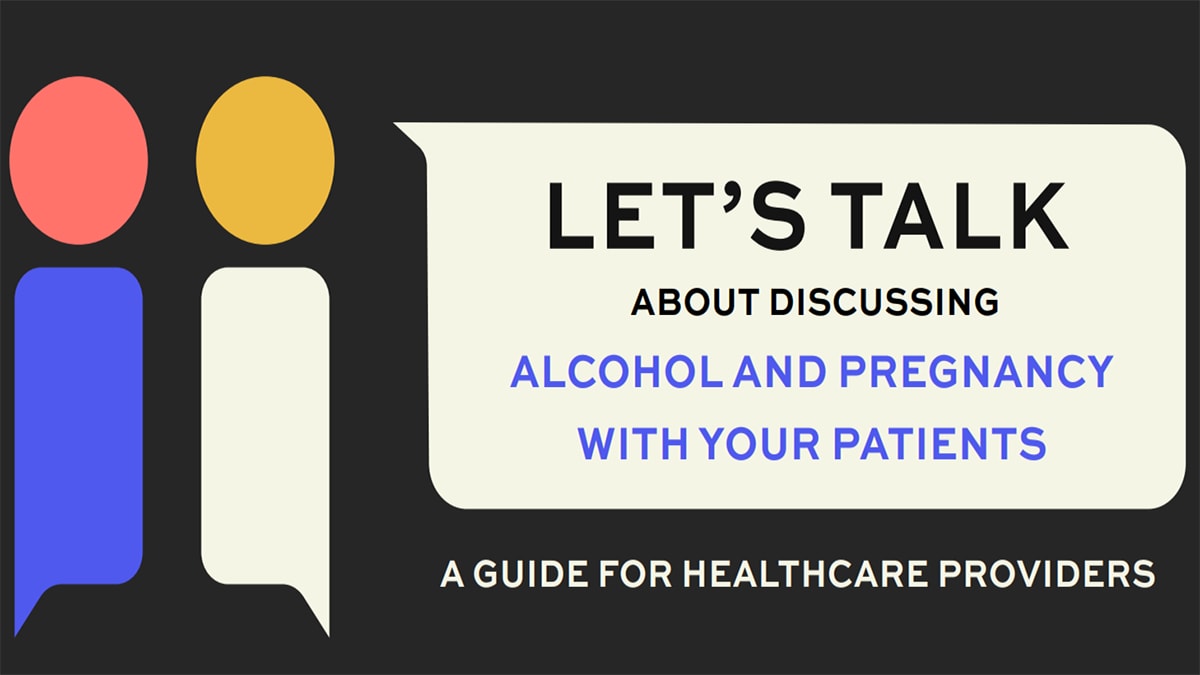Key points
- These resources and tools can help educate healthcare professionals about fetal alcohol spectrum disorders (FASDs).
- Resources include free online courses, information to facilitate patient-provider communication, and other materials.

Educational offerings
These courses are free and allow learners to save their progress—thus offering the flexibility to take the training as schedules permit.
For courses related to alcohol use during pregnancy, visit Alcohol and Pregnancy: Online Trainings and Resources.
This online training course provides information on screening and assessing individuals for fetal alcohol spectrum disorders (FASDs).
These brief videos provide additional information and are designed to complement the online CDC courses. The videos do not provide continuing education.
For supplemental learnings related to alcohol use during pregnancy, visit Alcohol and Pregnancy: Online Trainings and Resources.
Following this video, the learner will have increased confidence in talking to mothers and families about potential prenatal exposure to alcohol.
This video describes the steps and techniques for communicating with a family about the need for a patient to be assessed for a suspected FASD.
Podcast—Alcohol and Pregnancy: The More You Know
Two seasons of the podcast are available. Each season offers free continuing education credits (CME, CNE) through Boston University Chobanian & Avedisian School of Medicine. Episodes include interviews with experts in the field, people with lived experience, patient advocates, and demonstrations of difficult conversations with patients.
Tools
CDC and its partners have resources to help prevent alcohol and other substance use during pregnancy and provide care for children with FASDs and their families.
The American Academy of Family Physicians (AAFP) provides resources to help physicians recognize and address excessive alcohol use. Resources include an alcohol and other substance use practice manual, a CME activity--Addressing Prenatal Alcohol and Other Substance Use, training and resources related to alcohol and other substance use during pregnancy, and information on reimbursement and coding for screening and intervention.
The University of Nevada, Reno, in collaboration with the American Association of Medical Assistants (AAMA), has developed resources to help maximize the limited time medical assistants have with patients during appointments. This includes a series of Walk & Talk products for medical assistants to provide important reminders about alcohol and other substance use.
The University of Alaska Anchorage collaborates with the Association of Women's Health, Obstetric and Neonatal Nurses (AWHONN) and the Association of Nurse Practitioners in Women's Health (NPWH). Together, they work to increase knowledge and skills among advanced practice nurses and midwives about the health impact of excessive alcohol use, including any alcohol use during pregnancy. Products include a series of "I am a champion because..." videos featuring nurses explaining why they are FASD champions and how others can get involved; a modular curriculum to support women's health nurses practitioner and midwifery education faculty to incorporate FASD-related content into their courses; and short videos on a variety of topics related to FASDs, alcohol screening and brief intervention, and preventing alcohol use during pregnancy.
The American College of Obstetricians and Gynecologists (ACOG) has developed an FASD prevention program that provides physicians with resources and tools to communicate with patients about alcohol use during pregnancy. Fetal Alcohol Spectrum Disorders: Ethical and Legal Perspectives is a free, online learning module. It helps healthcare professionals consider legal issues and ethical principles used in FASD prevention efforts. The eModule offers continuing medical education and maintenance of certification credits. The program also includes tools and videos to help providers address alcohol use during pregnancy and provide alcohol-related resources specific to each ACOG district or section.
The American Academy of Pediatrics (AAP) has developed a comprehensive, web-based FASD toolkit. The toolkit has resources for pediatricians to raise awareness, promote developmental surveillance and screening, and ensure that all children living with FASDs and their families receive appropriate and timely care. This comprehensive toolkit serves as a framework for the management of a child with an FASD in the medical home (a term that describes patient-centered, team-based health care led by a healthcare provider). The toolkit includes information on identification, diagnosis, referral, patient management resources, practice management tools, frequently asked questions for providers and families, and resources for in-depth training.
Additionally, AAP offers resources to help pediatricians and other healthcare providers incorporate screening, brief intervention, and referral to treatment into their practices to reduce, delay, prevent, or stop adolescent substance use.
The University of Texas at Austin has partnered with the National Association of Social Workers (NASW) and the NASW Foundation to reach social workers at both national and state levels in the prevention of alcohol and other substance use during pregnancy and FASDs. Resources include a series of blogs to help social workers understand their role in making alcohol screening and brief intervention part of routine care.

